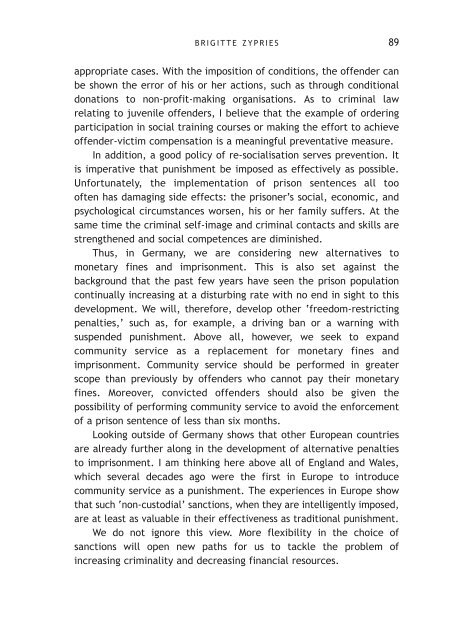Where Now for European Social Democracy? - Policy Network
Where Now for European Social Democracy? - Policy Network
Where Now for European Social Democracy? - Policy Network
Create successful ePaper yourself
Turn your PDF publications into a flip-book with our unique Google optimized e-Paper software.
BRIGITTE ZYPRIES 89appropriate cases. With the imposition of conditions, the offender canbe shown the error of his or her actions, such as through conditionaldonations to non-profit-making organisations. As to criminal lawrelating to juvenile offenders, I believe that the example of orderingparticipation in social training courses or making the ef<strong>for</strong>t to achieveoffender-victim compensation is a meaningful preventative measure.In addition, a good policy of re-socialisation serves prevention. Itis imperative that punishment be imposed as effectively as possible.Un<strong>for</strong>tunately, the implementation of prison sentences all toooften has damaging side effects: the prisoner’s social, economic, andpsychological circumstances worsen, his or her family suffers. At thesame time the criminal self-image and criminal contacts and skills arestrengthened and social competences are diminished.Thus, in Germany, we are considering new alternatives tomonetary fines and imprisonment. This is also set against thebackground that the past few years have seen the prison populationcontinually increasing at a disturbing rate with no end in sight to thisdevelopment. We will, there<strong>for</strong>e, develop other ‘freedom-restrictingpenalties,’ such as, <strong>for</strong> example, a driving ban or a warning withsuspended punishment. Above all, however, we seek to expandcommunity service as a replacement <strong>for</strong> monetary fines andimprisonment. Community service should be per<strong>for</strong>med in greaterscope than previously by offenders who cannot pay their monetaryfines. Moreover, convicted offenders should also be given thepossibility of per<strong>for</strong>ming community service to avoid the en<strong>for</strong>cementof a prison sentence of less than six months.Looking outside of Germany shows that other <strong>European</strong> countriesare already further along in the development of alternative penaltiesto imprisonment. I am thinking here above all of England and Wales,which several decades ago were the first in Europe to introducecommunity service as a punishment. The experiences in Europe showthat such ‘non-custodial’ sanctions, when they are intelligently imposed,are at least as valuable in their effectiveness as traditional punishment.We do not ignore this view. More flexibility in the choice ofsanctions will open new paths <strong>for</strong> us to tackle the problem ofincreasing criminality and decreasing financial resources.



